|

"Tell me what you eat and I'll tell you what you are" And what would our
philosopher tell us about Tunisians ?
Plain folk - for whom bread remains the staff of life. From the urban
"baguette" to the unleavened country bread baked in a clay domed oven "tabouna"
, each region boasts its specialty. Freshly baked bread is available
throughout the day and no family meal is complete without it.
 |
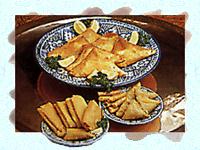 |
Sophisticated gourmets
- Tunisians' pride themselves on their fine taste buds. Indeed woe
to the chef who forgets the touch of cumin in a grilled fish or the
bay leaf in the mloukhia, a beef stew thickened with corčte. Lamb is
the basis of most meat dishes and purchased from one's family
butcher after close examination and exhaustive questioning as to the
region, season, breed and age. A favorite way to prepare young lamb
is coucha - portions of shoulder meat are rubbed with a sauce of
olive oil, salt, a sprig of mint, a touch of cayenne pepper and
turmeric and baked in a slow oven in a tightly covered earthenware
dish . |
 |
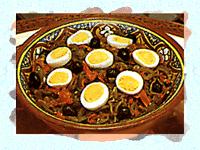 |
A summer "dinner" may
consist of home pressed olive oil, a
few green olives, country bread, heavy and grainy and a salad of
sliced scarlet radishes or plump tomatoes served with grilled fish.
Pampered by miles of coast and a unpolluted and generous sea,
seafood is a mainstay of the Tunisia diet. Without question, the
blue ribbon goes to the Rouget -red mullet, a delicious fish either
grilled or fried . The varieties of seafood from the imperial royal
shrimp to the familiar and much appreciated sardine are endless and
each region has its recipes and secrets for preparation. Jerba in
particular is known for the excellence of these gifts of the sea. |
 |
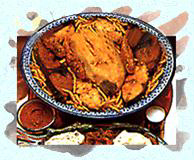 |
Tunisian meals are
social events and the longer the better. A typical meal would begin
with shorba frik- lamb soup with flavored with tomato paste,
coriander, parsley and seasonings in which green spring wheat grains
are slowly simmered, is served with slices of lemon. Brik, followed
by Slata mechouia - grilled green peppers , tomatoes and garlic
finely chopped .Spices and olive oil are added and the salad is
garnished with tuna fish, hard eggs, olives and capers. Dinner will
now begin. Assorted stews follow roasts of lamb, veal or fish,
tajine - a rich, flavorsome omelet baked with chopped meat,
vegetables and cheese. Fresh salad, fruits, pastries and custards,
coffee and tea make the finale. |
 |
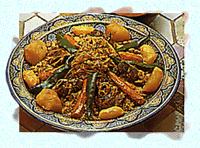 |
Holidays are occasions
for the preparation of traditional specialties and though there is
some leeway given to the chef'screativity, the main ingredients vary
little. On the Mouled, zgougou ,a sweet pudding of ground pine seeds
, topped by a vanilla cream and decorated with grated nuts is served
throughout Tunisia. The Aid El Fitr, a day marking the end of the
Ramadan fast is celebrated by families visiting each other, bringing
and receiving plates of pastries, homebaked or purchased with
bakloua or makroudh as all time favorites. Aid El Kebir brings to
the table a myriad of dishes prepared with lamb- cuminia,osbane,
mechoui, lamb chops or cuts grilled over charcoal. Ras El Am, the
Moslem New Year is greeted not with champagne but with mloukhia. |
 |
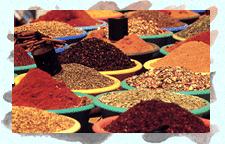 |
While most Tunisians like their food hot and spicy, restaurants and
hotels prepare their menus considering the tastes of their visitors
and serve harissa separately. This condiment is made of crushed
dried red peppers, garlic and spices and adds a definite zest to any
meal. It is a mainstay of many dishes and can be toned down by a
touch of olive oil. Many menus are also printed with English, German
and French translations of the dishes.
|
Sweet loving
Tunisians have adopted the Turkish baklava - layers of whisper thin
pastry interspersed with ground pine nuts, almonds, hazelnuts and
pistachios, bathed in golden butter, baked and dipped in a honey syrup.
No holiday, wedding, christening or dinner party could be considered
without it. Other sweets, makroudh ,a specialty of Kairouan of semolina
pastry stuffed with dates, caak, almond paste wrapped in fine dough ,as
well as a myriad of regional specialties make up the traditional platter
served for every joyous occasion. The vast almond orchards of Sfax
supply the different types of almonds that are the basic ingredient of
most sweets and cakes. Tunisian pastries are given as gifts for holidays
and are well worth a trip to the nearest pastry shop. |





